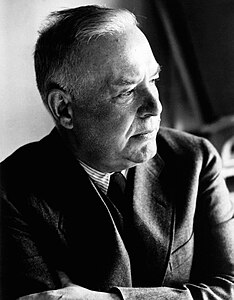Analysis of Looking Across the Fields and Watching the Birds Fly
Wallace Stevens 1879 (Reading) – 1955 (Hartford)
Among the more irritating minor ideas
Of Mr. Homburg during his visits home
To Concord, at the edge of things, was this:
To think away the grass, the trees, the clouds,
Not to transform them into other things,
Is only what the sun does every day,
Until we say to ourselves that there may be
A pensive nature, a mechanical
And slightly detestable operandum, free
From man's ghost, larger and yet a little like,
Without his literature and without his gods . . .
No doubt we live beyond ourselves in air,
In an element that does not do for us,
so well, that which we do for ourselves, too big,
A thing not planned for imagery or belief,
Not one of the masculine myths we used to make,
A transparency through which the swallow weaves,
Without any form or any sense of form,
What we know in what we see, what we feel in what
We hear, what we are, beyond mystic disputation,
In the tumult of integrations out of the sky,
And what we think, a breathing like the wind,
A moving part of a motion, a discovery
Part of a discovery, a change part of a change,
A sharing of color and being part of it.
The afternoon is visibly a source,
Too wide, too irised, to be more than calm,
Too much like thinking to be less than thought,
Obscurest parent, obscurest patriarch,
A daily majesty of meditation,
That comes and goes in silences of its own.
We think, then as the sun shines or does not.
We think as wind skitters on a pond in a field
Or we put mantles on our words because
The same wind, rising and rising, makes a sound
Like the last muting of winter as it ends.
A new scholar replacing an older one reflects
A moment on this fantasia. He seeks
For a human that can be accounted for.
The spirit comes from the body of the world,
Or so Mr. Homburg thought: the body of a world
Whose blunt laws make an affectation of mind,
The mannerism of nature caught in a glass
And there become a spirit's mannerism,
A glass aswarm with things going as far as they can.
| Scheme | XXX XXX AXA XXX XXX XXX XBX CAX XXX XXB XXX XXX XXX DDC XXX |
|---|---|
| Poetic Form | |
| Metre | 010110010010 11010101101 111011111 1101010101 1101101101 11010111001 011110011111 0101000100 010111 11110010101 011100000111 11110100101 01100111111 111111100111 01111100101 111010011111 00100110101 01101110111 111011111101 1111101100110 001010101101 0111010101 0101101000100 1100100011101 010110010111 001110001 111111111 1111011111 110110 0101001010 11010100111 1111011111 11111101001 11110110101 01110010101 10110110111 0110010110101 0101101011 10101110101 01011010101 1110101010101 1111101011 01001101001 0101010100 011111011111 |
| Closest metre | Iambic hexameter |
| Characters | 1,953 |
| Words | 372 |
| Sentences | 13 |
| Stanzas | 15 |
| Stanza Lengths | 3, 3, 3, 3, 3, 3, 3, 3, 3, 3, 3, 3, 3, 3, 3 |
| Lines Amount | 45 |
| Letters per line (avg) | 34 |
| Words per line (avg) | 8 |
| Letters per stanza (avg) | 101 |
| Words per stanza (avg) | 25 |
Font size:
Submitted on May 13, 2011
Modified on March 14, 2023
- 1:52 min read
- 193 Views
Citation
Use the citation below to add this poem analysis to your bibliography:
Style:MLAChicagoAPA
"Looking Across the Fields and Watching the Birds Fly" Poetry.com. STANDS4 LLC, 2024. Web. 28 Apr. 2024. <https://www.poetry.com/poem-analysis/37896/looking-across-the-fields-and-watching-the-birds-fly>.


Discuss this Wallace Stevens poem analysis with the community:
Report Comment
We're doing our best to make sure our content is useful, accurate and safe.
If by any chance you spot an inappropriate comment while navigating through our website please use this form to let us know, and we'll take care of it shortly.
Attachment
You need to be logged in to favorite.
Log In